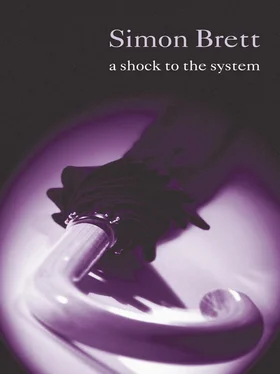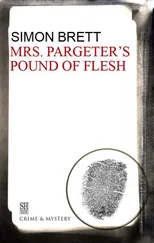Simon Brett - A Shock to the System
Здесь есть возможность читать онлайн «Simon Brett - A Shock to the System» весь текст электронной книги совершенно бесплатно (целиком полную версию без сокращений). В некоторых случаях можно слушать аудио, скачать через торрент в формате fb2 и присутствует краткое содержание. Жанр: Криминальный детектив, на английском языке. Описание произведения, (предисловие) а так же отзывы посетителей доступны на портале библиотеки ЛибКат.
- Название:A Shock to the System
- Автор:
- Жанр:
- Год:неизвестен
- ISBN:нет данных
- Рейтинг книги:3 / 5. Голосов: 1
-
Избранное:Добавить в избранное
- Отзывы:
-
Ваша оценка:
- 60
- 1
- 2
- 3
- 4
- 5
A Shock to the System: краткое содержание, описание и аннотация
Предлагаем к чтению аннотацию, описание, краткое содержание или предисловие (зависит от того, что написал сам автор книги «A Shock to the System»). Если вы не нашли необходимую информацию о книге — напишите в комментариях, мы постараемся отыскать её.
A Shock to the System — читать онлайн бесплатно полную книгу (весь текст) целиком
Ниже представлен текст книги, разбитый по страницам. Система сохранения места последней прочитанной страницы, позволяет с удобством читать онлайн бесплатно книгу «A Shock to the System», без необходимости каждый раз заново искать на чём Вы остановились. Поставьте закладку, и сможете в любой момент перейти на страницу, на которой закончили чтение.
Интервал:
Закладка:
The endowment mortgage had been arranged through a broker and Graham had not before studied the documents in detail. Now he did, and found out on exactly what terms he and Merrily had made the purchase of their house.
And what he found out, he relished.
One phrase in particular appealed to him. It was the definition of the endowment policy by which the mortgage was guaranteed:
JOINT LIFE WITH SUM INSURED PAYABLE ON FIRST DEATH.
CHAPTER NINE
Once he had decided to kill Merrily, Graham Marshall felt a kind of peace. He had reached a logical decision and now could allow himself a lull before he implemented that decision. He felt the lightness that follows arrival at a destination.
He had no doubts about the logic of what he had decided. There were three unanswerable arguments in favour of killing his wife.
The first was the financial one. To have the mortgage paid off would revolutionise his life. The payments to the building society and insurance company were by far the largest monthly drains on his income. With them out of the way, he would start again to feel some financial latitude in his affairs.
The second argument was that being married was a bar to the kind of lifestyle he was now determined to recapture. He had sufficient self-knowledge to realise that he was not dependent on close emotional ties. He should have been aware of this earlier, before he was trammelled by the bonds of family, but now he had recognised his nature, he owed it to himself to get out of his current situation as soon as possible.
The third reason for killing Merrily was that he couldn’t stand her.
And the qualms and uncertainties that would divert most potential murderers between the intention and the act did not affect Graham Marshall. Thanks to the old man on Hammersmith Bridge, he had no doubts about his capabilities. He had committed murder. He had gone the distance.
Increasingly he found his thoughts translating the murder into sporting metaphors. This was a habit that had been with him from schooldays. Though unexceptional on the track and field, he had always seen academic competition in terms of a race. Revision had been a period of intensive training, to ensure peak fitness and performance on examination day.
The murder was now part of the same imagery, a major challenge which he had met. It was as if he had completed his first marathon. From now on he knew he could go the distance; it was just a matter of improving his performance.
Having decided Merrily’s fate, he felt again as if he were entering a period of intensive training.
He also felt renewed strength in his identity when it came under threat.
Which was just as well, because his identity received a considerable blow on the Monday morning, when he was summoned to Robert Benham’s office.
After Stella had showed him in, Graham began by thanking Robert for ‘a really terrific weekend’.
‘Oh yes. Glad you enjoyed it.’ The dismissive tone made this sound like a reprimand, as if Graham were gratuitously introducing his private life into office hours. Robert moved quickly on. ‘Listen, I’ve just had a letter about a three-day conference in Brussels. Set up by some EEC committee. I gather it’s a comparative study of personnel methods in the member countries. I want you to go and wave the Crasoco flag.’
Graham was gratified. Very few foreign trips came the way of the Personnel Department. He got the occasional day or maybe an overnight at one of the regional offices, but other countries were administered either locally or from America. On the rare occasions when opportunities for travel had arisen in the past, George Brewer had appropriated them.
So it was good news. The Brussels trip sounded like a classic non-essential freebie. Maybe, Graham began to think, life under Robert Benham wouldn’t be so bad.
‘Oh, that sounds. .’ He was about to say ‘fun’, but realised that the word might lack gravity, so substituted,
‘. . interesting. When is it?’
‘22nd to 24th of April,’ replied Robert, looking at him with unusual intensity.
‘Well, that should be. .’ Then Graham realised the reason for the look. ‘But the Departmental Heads’ Meeting is on the 23rd.’
‘That’s right.’
The Departmental Heads’ Meeting was an important part of Graham’s power-base within the company. Twice a year the heads of all the London departments, as well as the regional ones, met to discuss staffing problems and proposals. Chairing the meeting was one of the tasks George Brewer had willingly relinquished to his assistant, and it was a job that Graham enjoyed. It also gave him an insight into the fortunes of the various sectors of the company, privileged information that fuelled his own scheming over the next six months. Excluding him from the Departmental Heads’ Meeting would remove his finger from the company’s pulse.
‘But, Robert, I chair that meeting.’
‘ Have chaired it in the past. I think it’s a job that should be done by the Head of Personnel.’
Graham considered his position. There was no doubt that Robert had planned this annexation of responsibility. The casual line of ‘just had a letter about a three-day conference’ did not fool him. Robert had certainly made up his mind to send Graham to Brussels the previous week; the softening-up of the weekend had been calculated and this new assault was definitely a challenge. Graham now understood the game Robert was playing. It was the tactic of any conqueror — to relax his victims with assurances, and then to remove their liberties piecemeal, in a series of small raids, none in themselves big enough to warrant resistance. Robert was working on the assumption that the worm wouldn’t turn.
But Graham was not prepared to submit that easily. ‘O.K., that’s a point of view, Robert. I don’t agree with it, but obviously you’re entitled to your opinion.’ He paused. ‘However, I would point out that on April 23rd George Brewer will still be Head of Department. I think I should consult him before I agree to go to this conference.’
‘I’ve squared George.’
Robert spoke with finality. Graham knew there was no point in appealing to the older man. George would only bid for sympathy, agree that no one took any notice of him any longer, and plead for company in another maudlin drinking session. Graham had been thoroughly outmanoeuvred.
It was like the weekend, designed to diminish him and make him feel subservient to Robert Benham. The only thought which protected Graham from its full effect was the knowledge that he had done something that Robert had never achieved. He had committed a murder.
And was going to commit a second.
As he left Robert’s office and passed George’s he gave himself another boost by inviting Stella out for a drink after work. She consented, suggesting that this time, rather than leaving together, they should meet in the wine bar. He liked her practicality, the precision with which she followed a sequence of steps she had certainly trodden before. He wondered how many of his colleagues had trodden them with her.
He liked talking to Stella. Again he found that evening it was a relief to be with a woman who made no demands on him and who talked about things that were not part of his daily life. He relaxed, and felt his relaxation was justified, a licensed day out from training so that he didn’t become obsessed with thinking of the challenge ahead.
As they emerged after three glasses of wine, Stella said she’d be happy to cook him supper one night, and Graham realised with slight shock that this was a sexual invitation.
Sex had not figured much in his thoughts since he had killed the old man. His fantasies of expensive women were intellectual, not physical, desires. No doubt he had made dutiful love to Merrily a few times and he had certainly fell sexual envy for Robert and Tara at the weekend, but lust had not been a strong motive. He wondered if it ever had for him. The ‘Swinging London’ experiments of his twenties and his marriage to Merrily had, in retrospect, been prompted more by the demands of convention than importunate desire. And now that there was something else of significance in his life, he felt no shame in admitting that sex was not very important to him.
Читать дальшеИнтервал:
Закладка:
Похожие книги на «A Shock to the System»
Представляем Вашему вниманию похожие книги на «A Shock to the System» списком для выбора. Мы отобрали схожую по названию и смыслу литературу в надежде предоставить читателям больше вариантов отыскать новые, интересные, ещё непрочитанные произведения.
Обсуждение, отзывы о книге «A Shock to the System» и просто собственные мнения читателей. Оставьте ваши комментарии, напишите, что Вы думаете о произведении, его смысле или главных героях. Укажите что конкретно понравилось, а что нет, и почему Вы так считаете.












